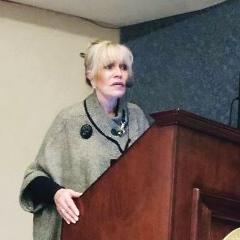
News

Sticks and stones may break your bones, but words will definitely harm you
STEVEN GRUZD
This thread ran through a talk by psychologist Brenda Lasersohn at the Rabbi Cyril Harris Community Centre in Johannesburg last Wednesday titled, “The culture of hate – prejudice: society’s greatest ill?”
The xenophobic attacks, hate speech, and gender-based violence dominating the local news makes hate a crucial topic to interrogate. “In difficult times both locally and globally, people feel vulnerable,” said Lasersohn. “They blame others, seen as different to themselves, for their problems.”
She noted that today, worldwide, there is bigotry and extremism on the political left, to the right, and in the middle. The United States has witnessed many mass shootings based on prejudice. “We have to protect ourselves, but we don’t have to hate back,” Lasersohn said.
Hate springs from believing one’s own group is better than others. “Belief fires emotion, and can lead to violent action. When our context becomes more uncertain, people become more hateful and cruel.” Stereotyping and scapegoating also increase. Jews are frequently the victims in these cases. She believes that “anti-Zionism” is usually a mask for anti-Semitism.
Lasersohn argued that the opposite of hate is not love, or indifference, or even forgiveness, but showing humanity. “We must refuse to be pulled into the cycle of hate that perpetuates generational, cultural hatred, and hate of difference.”
How we speak, the words we use, and what we tell our children can also fuel hate. “Language is used as a tool of diminishment and degradation in order to wound and damage the sense of self,” Lasersohn said. ‘It hurts and humiliates. Symbols, flags, salutes, statues, and names can represent dehumanisation.”
As an example, she related how her grandmother called her gardener “John” for 30 years. His real name was Samuel. But she called him John because Samuel was the name of her own son. Many of that generation pejoratively referred to a grown man as a “garden boy”. She also disapproves of the various derogatory names Jews use for non-Jews, as it demeans and dehumanises the “other”. These names influence whoever hears them, especially children.
Lasersohn defined hate speech as “abusive or threatening speech that expresses prejudice against a particular group especially on the basis of race, religion, or sexual orientation, or challenges their experience”.
She reflected on the hate-speech case brought by the South African Jewish Board of Deputies against the Congress of South African Trade Union’s Bongani Masuku. This case has been through several levels of the country’s courts, and is currently before the Constitutional Court. She quoted advocate Gilbert Marcus who said that we “cannot discount the intention of the utterer”. These words were meant, deliberately, to wound.
“Language is not neutral,” Lasersohn said. “We ‘hit people over the head’ with language, both in content and tone. Language can hurt and irreparably cause harm.”
And words can soon lead to deeds. A hate crime is “a crime typically involving violence that is motivated by prejudice on any ground – race, religion, sexual orientation, or any other difference perceived by the perpetrator as worthy of hate”.
Hate crimes seek to minimise the other, and render them invisible. “Once you dehumanise them, you can do anything to them – torture, trafficking, eradication, genocide, the Holocaust.”
Lasersohn continued, “In hard times, people fall into blaming, with a lack of awareness of the effects of our words and behaviour.
“Those in power define who is to be condemned, and often attribute power to others that they don’t have.” Anti-Semitic conspiracy theories that Jews rule the world are a case in point.
Feeling exposed, threatened, and fearful of attack, people may devise strategies of hate in reprisal.
But Lasersohn said hate could be combatted by “refusing to engage in acts of hate, including speech, and protesting against hateful judgements. We have a duty to bear witness to the stories of others’ lives. Their narratives change our lives and hearts.
“Integrating and hearing others’ stories is not assimilation. It’s connecting others different to ourselves into the bundle of humanity of which we are a part.
“If hate is a product of our culture, we can refuse to hate, and we can reshape our culture one word at a time.
“Simply said, compassion is caught, not taught. Being respectful has everything to do with being human. What we give we are likely to receive. We must recognise our own hateful thoughts, words, messages, views, and beliefs.”
Finally, hate should be starved of food and oxygen. Lasersohn said, “If you want something to die, don’t feed it.”




